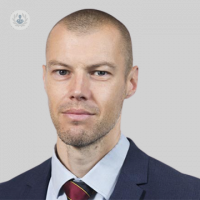Partial knee replacement: Your expert guide
Written by:For some patients with arthritis of the knee, a partial knee replacement, as opposed to a total knee replacement, is sufficient to relieve pain symptoms and improve mobility. To learn more, we invited esteemed consultant orthopaedic surgeon Mr Tom Symes to explain how a partial knee replacement differs from procedures which replace the entire knee joint. The leading specialist also discusses the recovery period and potential risks and complications associated with this type of knee replacement surgery, and explains when partial knee replacement is the appropriate choice.

What is a partial knee replacement? How does it differ from a total knee replacement?
A partial knee replacement involves replacing only 1 'compartment' of the knee, most commonly the medial compartment. It is easier to think of it as a half knee replacement. Most commonly, the inside half of the knee is replaced because this part of the knee is most commonly affected by arthritis. Less frequently the outer half or knee cap are replaced on their own. In a total knee replacement, the whole knee is replaced.
Importantly, when a partial knee replacement is performed, all the ligaments in the knee are left in place and as a result, the knee functions more normally afterwards. If a total knee replacement is required, one or more of the ligaments has to be cut or released and the knee feels less normal afterwards.
Patients who have a partial knee replacement normally get a better range of movement than total knee replacement patients. Additionally, patients who undergo partial knee replacement can usually be discharged quicker from the hospital, have less pain and recover more quickly. There is also some evidence that they are at lower risk of medical complications such as blood clots and heart attacks.
What are the most common reasons for undergoing a partial knee replacement?
The most common reason for undergoing a partial knee replacement is arthritis. Arthritis usually starts on the inside (medial half) of the knee and, if it is treated early enough, patients can undergo a partial knee replacement. If the arthritis progresses and spreads to the rest of the knee, then a full replacement is needed.
How long is the recovery period after a partial knee replacement surgery?
Partial knee replacement can usually be done as a day case operation, meaning that most patients do not require an overnight stay in hospital. Sticks or crutches will be needed for three to six weeks after surgery. After six weeks, patients can begin driving and may return to work after eight to twelve weeks. Full recovery can take up to six months but the knee will feel less painful than before the operation within one to two months of surgery.
Are there any potential risks or complications associated with partial knee replacement?
The normal risks of surgery apply but the chance of nearly all of these complications occurring is lower with a partial knee replacement compared to a total knee replacement.
In fact, the only risk that is higher with partial knee replacement surgery is the likelihood of requiring another operation. Most patients will not require any more surgery but the chance of needing another operation within ten years is one in ten after a partial knee replacement, while the chance of needing another operation within ten years is one in twenty after a total knee replacement.
Can a partial knee replacement be performed on both knees simultaneously?
Yes, this partial knee replacement can be performed on both knees simultaneously for the appropriate patient. Your specialist will be able to advise you on your suitability for this type of procedure.
If you require partial or total knee replacement surgery, and wish to schedule a consultation with Mr Symes to discuss your treatment options, visit his Top Doctors profile today.


